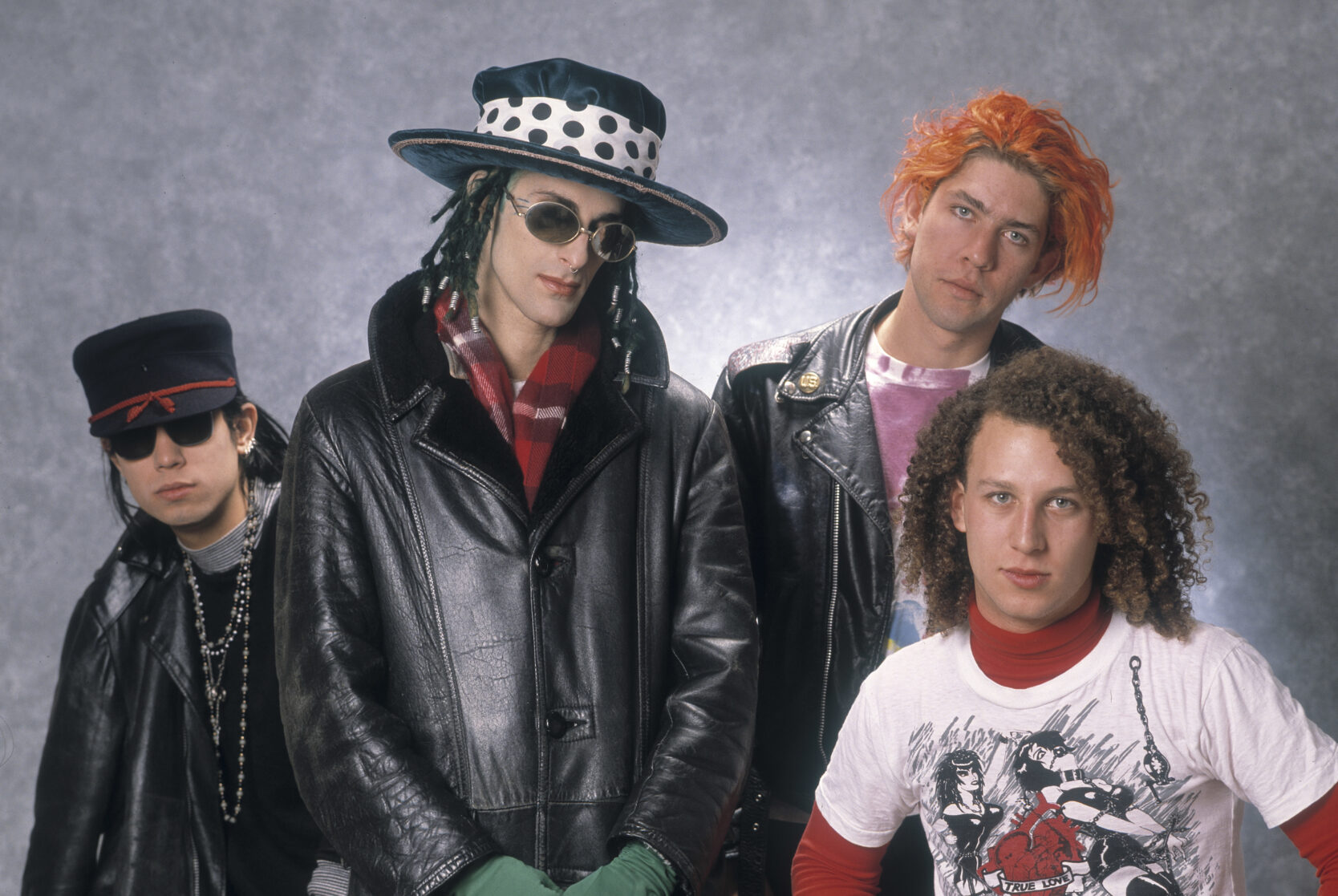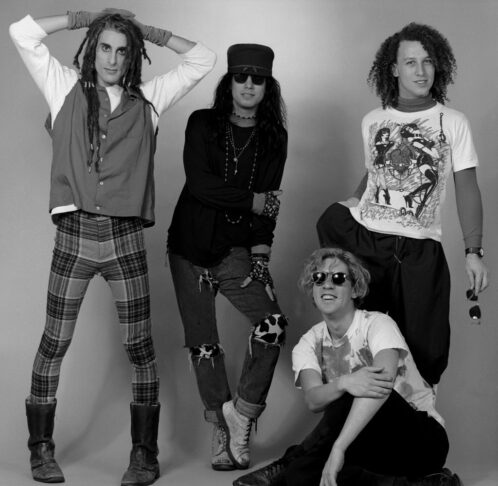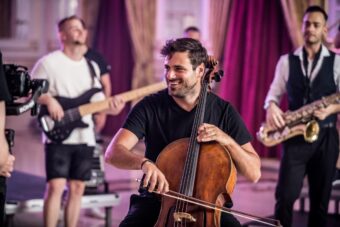This article originally appeared in the June 1991 issue of SPIN.
Jane's Addiction walks out and begins "Up the Beach," the opening track from Nothing's Shocking, the band's second album. The lean, bare torsos of Dave Navarro and Eric Avery are shining softly; their heads down, hung with guitars—radiating heat in an Amsterdam club called Paradiso.
Perry Farrell sidles up to the only microphone onstage in this old converted church, picking his way through a pile of dolls, statuary, religious icons, photos, fresh flowers, and other fetishes strewn all over the equipment. "Just some of my favorite stuff," he says. The odor of mums overwhelms the smell of cigarettes and old dust.
Again, a glimpse of Pacific Coast beach. In Eric's rolling bass line—the melodic swell that carries every Jane's Addiction song—a sculptural event is happening. Flares of single guitar chords peel up, like paper lifted by the wind. Perry is wrapped in a wind-breaker, his head shaved to black stubble, the spare antithesis to his now-famous persona as an electric bondage-gear dread queen. Drummer Stephen Perkins throws his arms up over his head with a smile of honest rapture. A wave breaks. Perry lowers a bottle of red wine and drones, "Heeeeere weeeeee go-oh nowwwwwww…"
The enormity of Jane's Addiction's power collapses over us and suddenly whatever the band does is right. The band invites us to swim in the evocative juice of Perry's poems and in its organic, untraditional metallic presence—but without waiting for an answer the warm wave licks our feet out from under us.
This isn't simply entertainment. The only other lyric in "Up the Beach" is the word home, and by the time Perry is mouthing it, he's covering a sly smile by drinking deep from the wine. The word raises goosebumps. Something sacred is rising in the old church. Paradiso. And the sacred thing is also slipping away—we are probably watching the last Jane's Addiction tour.
The quartet of raging talents that makes up Jane's Addiction has unconsciously married blues and metal to the 200-year-old artistic impulse called Romanticism. Yeah, in the Lord Byron-to-Rimbaud sense of the term. It just sort of leaked from the band's unabashed, almost microscopic sensualism. These four musicians celebrate a man whose self-knowledge is primitive and carnal—see "Pig's in Zen," "Ocean Size," and "Ain't No Right"—and assume a true and thus ethical personal freedom, applied to all matters of drugs, sex, politics, and even yet-unrecognized human rituals. They have found relief in the most common of occurrences: Beauty.
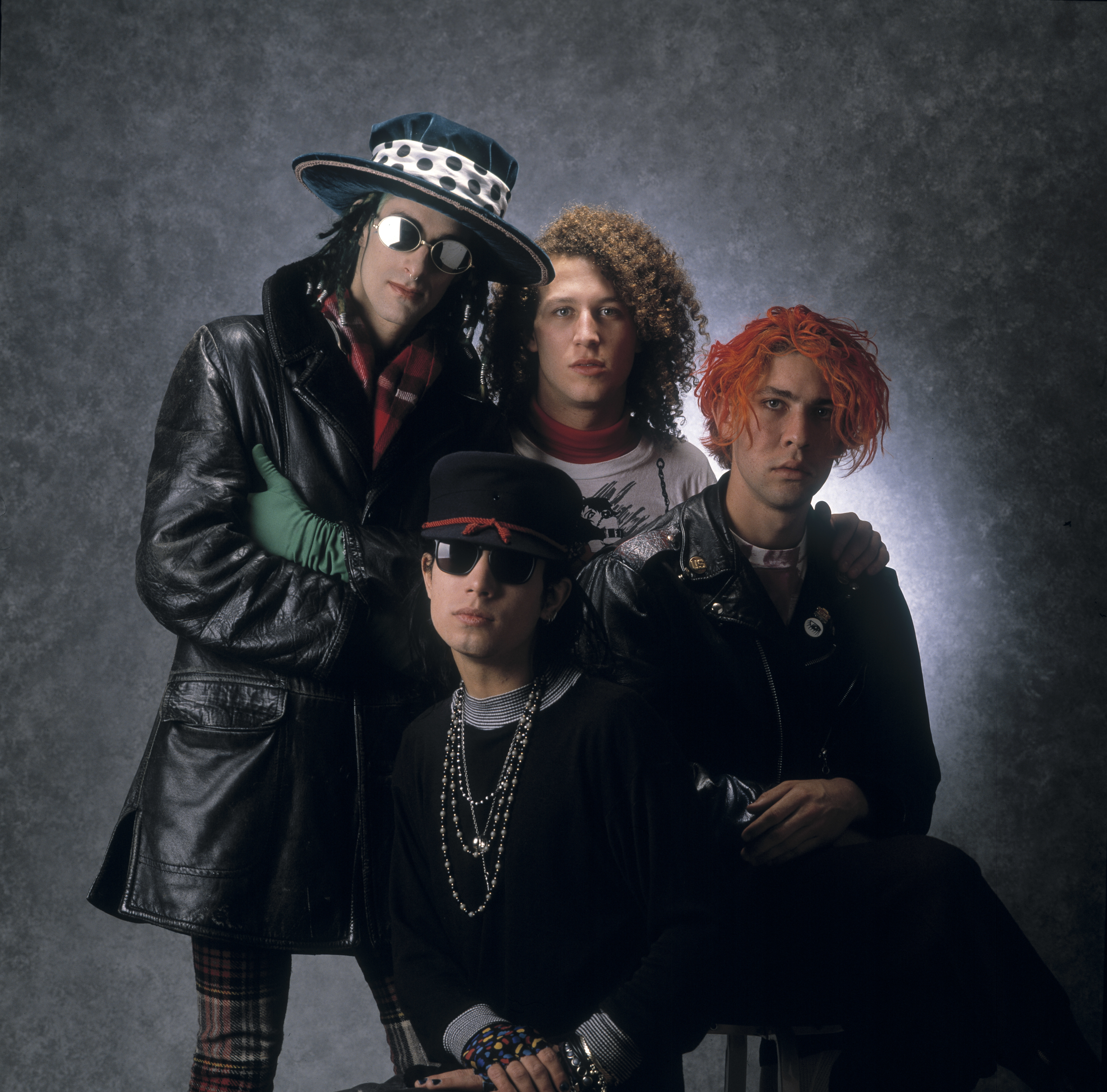 Paul Natkin/Getty Images
Paul Natkin/Getty Images
It's about time Jane's Addiction showed up to save rock'n'roll from wanking itself to death in hideous self-parody.
In the midst of all the apocryphal rage and warning shrieking from the gut of the band, it never fails to isolate moments of great insistent beauty and hold them up with the right word. Like home. Or the bucolic "Summertime Rolls." Or even the final pronouncement in "Mountain Song," a piece that pulls us to the center of Perry's unapologetic experience with heroin, where he screams for an end above the Janes' roaring wall—"Cash in!"
As though it were all a disposable game. Even the band itself. It is utterly impossible to know just what it's going to do from one moment to the next. Every day may be the guys' last as a band—by their own mutual agreement. And yet every day they grow more proficient, more full. This healthy ability to give it all up is what they're all about.
Perry finally doffs his windbreaker after the last strains of "Ain't No Right" to stand in grand understatement, like a gangster in an athletic T-shirt, baggy trousers, and suspenders.
"I am a Jew by birth!" Perry shouts. It's true; for all of 16 years he lived another life with his family in Flushing, Queens, as Perry Bernstein. His pop ran a jewelry store on 47th Street in Manhattan.
"Thanks for hiding my ancestors during the war!" he continues. The band members are looking away, used to this kind of outburst. The Dutch audience is still waiting for a reason to either hiss or cheer. "No, really, if it weren't for you people, I wouldn't be here right now. The folks back home asked me to say thanks."
Silence. "Hey, this is not a Nazi look. This is how we looked in the concentration camps." Utter silence. "That's a joke! My name's Perry and I'm into satanism and sports. That's another joke—I don't like sports! I guess you don't understand my sense of humor."
The Dutch journalist standing next to me leans over and says, "Don't think that they don't get these jokes; they do." but how do you respond to this, anyway? Perry acts like he's talking to himself. Maybe he is. Some guy has climbed onto a support rod in the upper arches of the church and is squatting there, agitated, jerking like a monkey about 60 feet above the floor. I was sure he was going to jump.
"Hey!" Perry shouts to the upper balcony, gesturing. "Do something up there! It either comes out your asshole, or it gives you cancer. You might as well laugh it out, right? Oh, another joke. I think it's funny. But then, I'm dying…"
Perry dying. More grist for the ol' rumor mill. No one is better at that than he is. It's all part of his continuing self-reinvention. This one started with a mysterious clinic report tucked in among the "stuff" included in the remarkable multimedia fetish Perry sculpted for the cover of their 1990 release, Ritual de lo Habitual. The report implies that Perry has tested positive for the HIV virus. Got his name on it. He's keeping it his own fucking business. "Today let us eat and drink, for tomorrow."
Monday is a day off in Amsterdam, and Jane's Addiction's general manager, Ted Gardener, feasts the band and crew at an Indonesian restaurant down on the Leidsestraat. There must be 40 different dishes at each of the two tables. Some people just eat, but Stephen and Perry are in their element, chattering back and forth about tastes and textures, scanning constantly for something they may have missed. Their sense of attack is infectious. Dinner becomes a sensual event.
Dave and Eric are missing, a common occurrence since they've confronted their addictions to heroin and other drugs. This is a band strangely unified by such tensions, but as the polarization deepens it becomes clearer why they must also blow apart in the near future. Eric and Dave (who has been traveling with his wife, Tanya) ditch for the hotel directly after most shows. Perry and Stephen, on the contrary, wait for the party to come to them.
It has been agreed that Eric and Dave can use the rear lounge of the tour bus whenever they need to retreat. They pass no judgment; they have simply learned that they cannot use drugs of any kind anymore without becoming slaves to them, and that slavery is death.
Perry makes no apologies. A few hours later, we sit together in the window at the Bulldog Cafe as he fires up a little aluminum foil pipe of the local hash. His close-set, razor-sharp eyes (I caught myself saying feral) fix on a point outside, and his tongue crackles to life. He's 32, he has money for the first time in his life, and he has plans. He has just finished 30 hours of film for his Warner Bros.-funded feature-length movie, Gift. I ask him how long he expects Jane's Addiction to last.
"The beginning of the new year [1992]," he firmly states, "I wanted to do another record. We have songs that we never got to record, and I just want to put the final collection together. There might be a spot that invites us somewhere, some good place like Japan or New Zealand or Bali—someplace wild—I don't know. But I don't want to go three months past the new year."
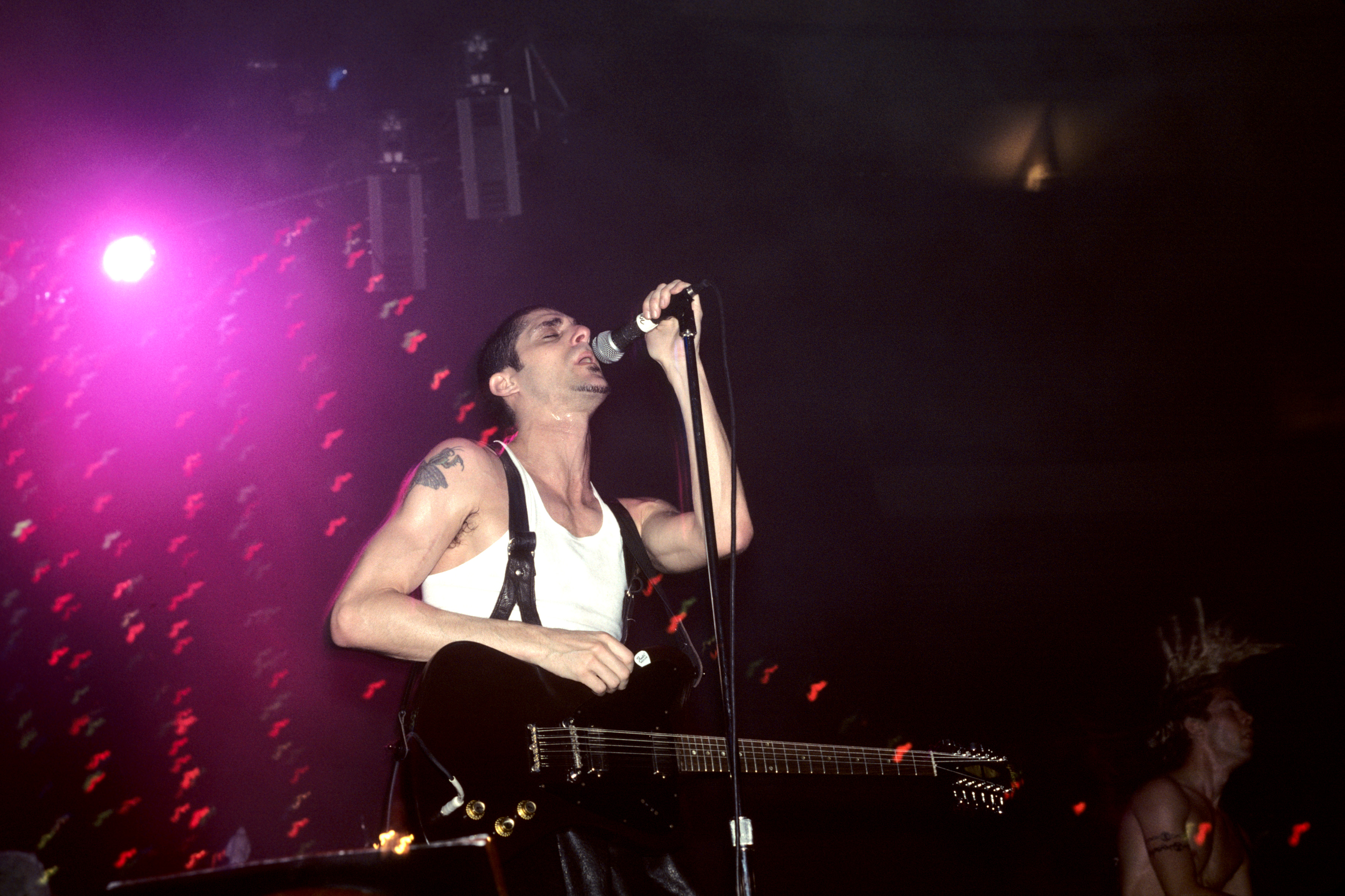 Ebet Roberts/Redferns
Ebet Roberts/Redferns
But the music ain't over. For the past few months, he's been nurturing his latest braichild—an enormous traveling music and alternative-living festival to be called the Lollapalooza Tour—which will kick off in July 1991 and make an annual summer event.
"Right now I'm interested in putting together humongous events. It's going to be a touring festival across America. It will last for a month, and will be a multimedia event, using music, art, and military discoveries and weaponry as forms of entertainment."
"What other elements do you want?" I ask. "Fire-eaters and tattoo shops and more circus stuff?"
"Well, you can only do so much per year—and being that this is the first year…I've got many surprises in store. Enough to make it, like, even if you hated every band, I don't see a way in hell that you could not find something about it that you liked. And if you didn't, then something's wrong with you—y'know what I mean?" He laughs.
"Yeah, like people who don't like to go to the circus."
"Right! Something's wrong with them. They just don't care to bite into the apple of life. And that's fine, y'know, they should just go somewhere and starve. This place is gonna be chock-full of fun things and I want to tell you what they are, but it's just so premature."
"As my main experiment, I want to see what happens with a major exchange of information. I don't like the idea of the world being controlled by the news media. We need to exchange ideas somewhere else, another forum. The cafes aren't being used anymore, so let's try it at a festival. Everybody's all of a sudden aware at a different level."
Nineteen-ninety was a strange and terrible year for Jane's Addiction, during which Ritual de lo Habitual went gold while the band's overt sensualism and simply refusal to compromise invited catcalls from everyone. Hard-rock figured these guys were fags, as usual, and Pop thought they were some Art Thing. Half the metalhead in America didn't dare love Jane's Addiction until some chicks convinced them it was heavy.
The wall-sized fetish Perry sculpted and photographed for the album's cover captures a tender ménage à trois involving Perry, his muse Casey Niccoli (and wife by a Mexican Santeria ceremony shown in Gift), and another woman known only as "our beloved Xiola Blue."
The figures are nude, and the art was rejected by most major distribution chains. Of course. But things softened as sales exploded, and I still haven't seen copy of the proposed alternative cover in stores, which was white and printed only with the First Amendment. Just like the 1988 release, Nothing's Shocking, which featured another of Perry's sculptures—the naked figure of Casey as a Siamese twin—sitting in a rocking love seat with her head(s) on fire: When the furor subsided, Jane's Addiction just shrugged.
And as for Perry's personal defense of free will…
"Aw fuck, in England? People were asking me: 'So, Perry Farrell'—question number one on the BBC—'so tell us all about your sleazy life.' And she said it with such a smile on her face, as if, 'We both agree that your life is sleazy, and isn't it adorable that you get to share it with us?'
"I say you don't have anything—you don't have a society—until the society is completely shameless. You have shame going through it, that's going to build aggression and suppression, and then people are gonna turn on anyone who does step out of line. If you're shameless, you feel like your sexual impulses—as long as they're within both people's free will—they're fine. Like your impulses to cry, to get wasted. Something bad happens to you, you know, you need a buffer—this earth supplies us with things to relax."
"The people who do drugs—I can see it in their eyes—they want me to hail it. And the people who don't do it want me to hang myself. They want an argument, like, 'Yeah, but what about kids out there?' But my opinion is this: that drugs can be beneficial and they are necessary. How they're used? If they're used improperly, just like a ski, you're gonna break your leg or even worse. So if you don't wanna ski? Don't ski. I wouldn't advocate being a drug addict to anybody; it's a waste of time."
"What can I say, man? Life is short. Get carried away. Be smart so you live to see another day. It's just like surfing—the whole point is to get out of the tube. The whole point about drugs is to wake up and tell the story to your brothers. Nature put 'em here and, as many claim, God is in control of Nature. If he wants them here, who am I to argue?"
Perry cracks a wide, mischievous smile and sucks at the hash. I ask him how that attitude lends spiritual quality to Jane's Addiction.
"Maybe all that there is, really, is the spirituality. Sometimes I feel like you can reach nirvana, like we're in nirvana right now but we just don't know it. This is as good as it gets. We think, 'I know there's got to be something else that makes me happier.' But maybe there isn't."
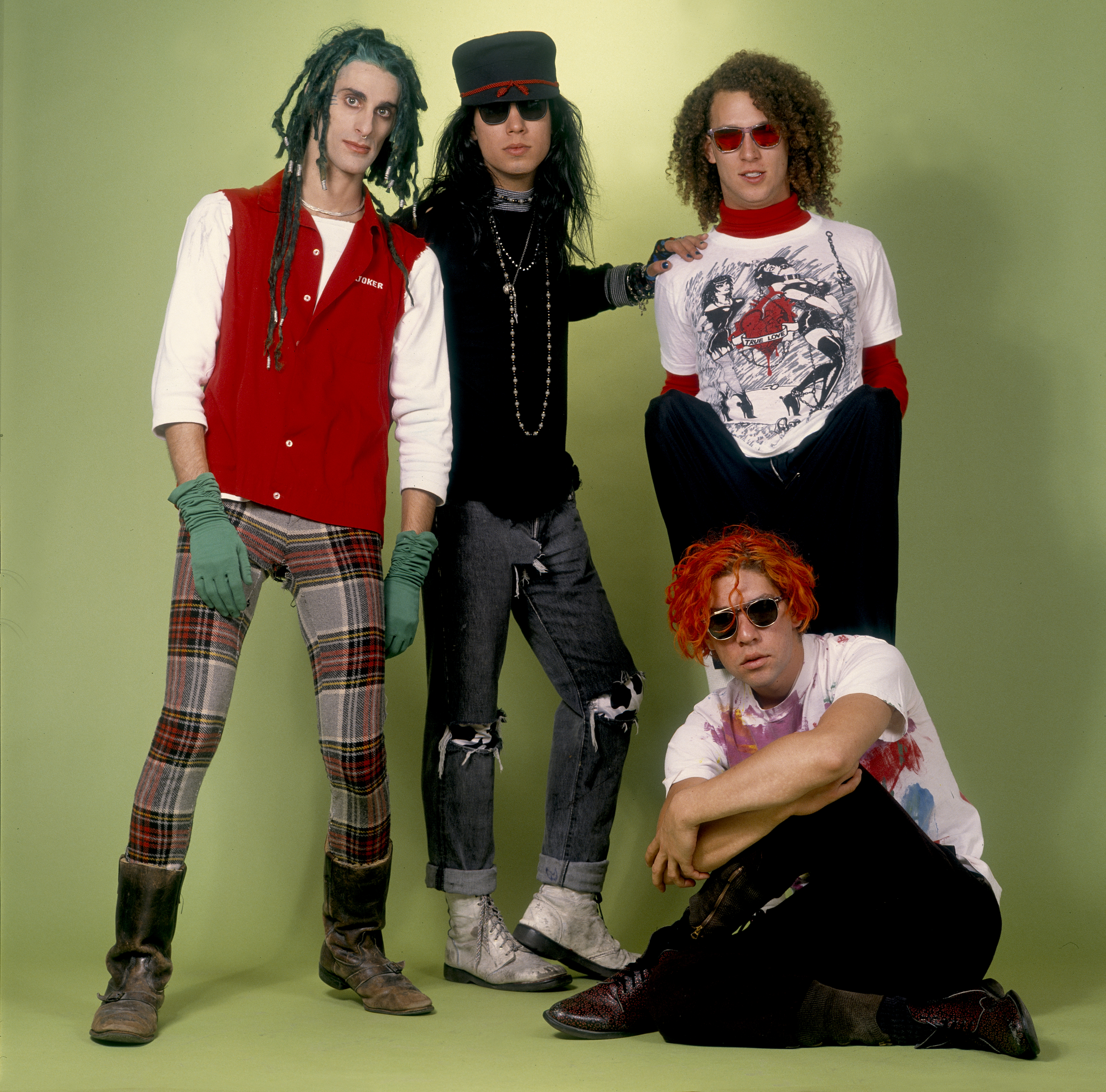 Paul Natkin/Getty Images
Paul Natkin/Getty Images
Jane's Addiction's genius has one collective id and four complete egos. The "penultimate day" tension which charges the space in the center of the band has been boosted by the slow blossoming of wild talent in Eric, David, and Stephen. The Janes have sublimated the strange power—for now—into a total commitment to the band. But, like Perry, they're all aching to pursue other forms of performance, visual, and textual art. They have reconciled themselves to embracing the end of this band exactly like they oversensualize everything else. They are savoring the end.
By the time I catch up with Eric on Sunday, he's already been to a panting exhibit in Rembrandt's house, and made plans to try and catch both a Bach concert and the Throwing Muses. I share my blather about Romanticism with him as we sit on a fire escape on the back wall of the Paradiso, suspended and isolated over a busy canal. The crocuses and tulips are oozing from a lawn across the green water.
"I think that we don't ever just talk in a nihilistic, punk-rock way about how shitty things are. All of us, as people, really are kind of—naive isn't the right word—but almost determinedly naive."
Jane's Addiction has grown in everyone's mind as an entity apart from the early dyed-black-and-nipples-pierced doom-and-gloom crowd in L.A.—a crowd on which the band fed for a while after Perry left his original band, Psicom, and was found by Eric in 1985.
The band looked the part, with the dreads and the dye and the smart hats, and it also had the sonic agony to whip up the nihilism and artful death. But the band has an uncanny instinct for Beauty.
"There're resolutions to the search. And even though they may be transitory and ephemeral, there is a resolution after each resolution, without a sense of giving up," Eric says.
Recently a friend who is conscious of Eric's struggle with drugs approached him and suggested he fill the void left by chemicals with a belief in God. Eric told the friend that, for him, art was better than any religion, because, as a committed cynic, there was no other place to be so readily reaffirmed of man's few shining qualities. Through art, you can see the potential for greatness in people you might normally hate.
"'Scratch a cynic and find a Romantic' is me and has been me previous to Jane's Addiction," says Eric with a nod. "I think that's a lot of us, but personally, that sums up my life from the time I was fourteen or something like that. I went to this cemetery about an hour and a half outside of L.A. with my girlfriend, because it's supposedly the most active parapsychological spot in North America. And I don't believe in ghosts. But I so wish that I could, y'know?"
"So my lack of belief in people has to exist because I believe that there must be someone out there who is good. It is the Romantic belief that breeds the cynic, because you look with Romantic eyes and you don't see what you want."
With the arrival of 1992, Eric plans to concentrate on writing and painting. Mostly writing. So does Dave Navarro. Mostly painting. Dave, like Eric, talks a lot about feeling "removed" from the juggernaut that Jane's Addiction has become.
"There's definitely a tension and an inner struggle within the band and myself, as far as that goes," says Dave, "because as much as I love playing live and producing albums with this band, on the other side I am just as excited about having it end. I want it to be over and have it be just a chapter in my life. I don't want to be 'the guitar player from Jane's Addiction' for my life. But it's something I've very pleased with at the moment."
After almost five years of being the most camera-shy member of Jane's Addiction—indeed, often simply missing in action for months at a time—Navarro gets the Most Improved Jane's Award. At the ripe old age of 23, he has emerged as one of the most eccentric, powerful, and studied guitar players around in the first few months of 1991. I am fascinated by what will become of his untrained, unpracticed, self-taught sonic-weaving technique in the absence of Perry's emotional punctuation. Or, for that matter, with another vocalist who can really sing instead of shriek.
"I think maybe a lot of that has to do with the absence of drugs and alcohol, to tell you the truth," says Navarro. "I also see it coming out in myself a lot, but—I tell you, I get so self-absorbed when I'm fucked up, and pretty much all that runs through my head is that I'm blowin' it. And that no one thinks I'm any good."
"I've been struggling with getting sober. That's not to say that I am. But I think that has a great deal to do with it. I find that performance is a wonderful thing when you're sober."
"Last year, it just looked real bad," remembers Stephen Perkins, casting an ever-vibrant glow in the American Cafe. The only Jane who was never addicted, the 23-year-old has had to sit by and watch the others slowly come around to sobriety. Or at least gain control, in Perry's case.
"We'd try to pull rehearsals together and Dave would call and say, 'Oh, I can't make it.' Perry would show up two hours late. Because of drugs. They were just more into getting high than working. And now it's turned around."
Dave and Stephen have played together since high school, when they skidded through a number of speed-metal outfits. When Stephen successfully auditioned for Perry and Eric in 1986, he suggested they try Dave as well.
"Somehow the inner tension of the band translates to the audience and to the listeners," muses Dave when challenged to pinpoint the band's strange power. "And translates in a way that is not understood. I've always found that sometimes things that are not completely understood are misinterpreted as spiritual. The old thing that 'The unknown is an attraction.' It's nothing that we set out to do."
"I've never really considered myself a musician. I'm basically self-taught; I never practice. I never pick up a guitar apart from onstage. I mean, we hardly rehears as a band, the four of us."
In the end, I find that Dave is best able to sum up what the tensions are within the band, and why there is a reason for it to end.
"I share opinions of [Perry's]," says Dave softly, his bright soft eyes and bushy black dreads ringing in the dark at the Nightwatch Cafe. "I don't know what his overall vision is, and I am aware of different ideas that he has, and some of them I agree with and some of them I don't. But I could hate everything he says and still stay in this band. It was just a mistake, a happy accident. This is what I'm doing now. It really comes down to that."
"I'm walking through this. I'm waiting, I'm riding it through, and I'm not a quitter. But at the same time, this is what I wanted. I don't think I'll ever be satisfied."

